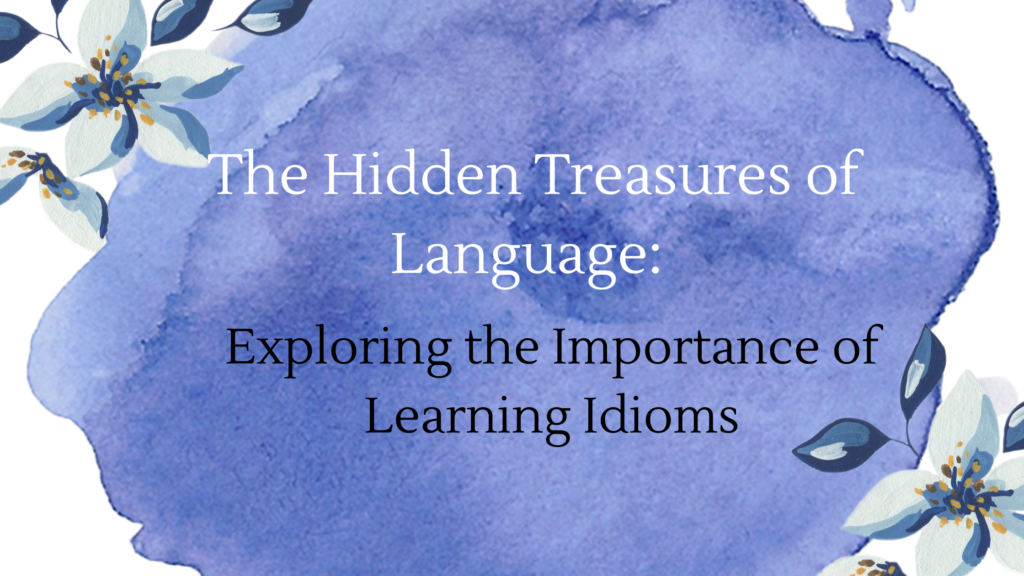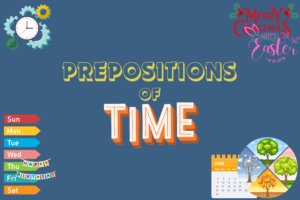Language is a vibrant tapestry woven with words, phrases, and expressions that reflect the rich cultural heritage of societies. Idioms, those captivating strings of words whose meanings often transcend their literal interpretations, hold a special place in this linguistic mosaic. In this article, we delve into the captivating world of idioms and unravel the reasons why understanding them is a vital aspect of language learning and cultural appreciation.
**1. Cultural Insights Beyond Words
Idioms serve as windows into the cultures from which they originate. They encapsulate the beliefs, history, and traditions of a society in a succinct phrase. Imagine learning about a culture’s affinity for the sea through idioms that involve maritime elements or comprehending the importance of perseverance through idioms rooted in historical events. By delving into idioms, we not only grasp the language but also gain a deeper understanding of the people who use them.
**2. Enhanced Communication
Conversations are not just about exchanging words; they’re about connecting on a meaningful level. Idioms, with their figurative language, allow us to express complex emotions and ideas that often fall short when conveyed literally. When you “break a leg” before an important event, it doesn’t imply physical harm; it’s a quirky way of wishing someone good luck. Learning such idioms equips us to communicate naturally, bridging the gap between language learners and native speakers.
**3. Literature and Media Comprehension
Literature and media are vessels that carry the essence of a culture. When you’re familiar with idioms, you gain a passport to exploring literary works and movies in their full glory. Idioms often weave themselves into the fabric of stories, adding depth to characters, situations, and dialogues. Recognizing these idiomatic threads enhances our comprehension and allows us to appreciate the artistry of storytelling across cultures.
**4. Expressiveness and Nuance
Language is a tool for expressing not just facts, but also emotions and nuances. Idioms condense a wealth of emotion and experience into a few words. When you “feel under the weather,” you’re not just indicating illness; you’re conveying a sense of discomfort. Mastering idioms empowers us to paint vivid pictures with our words, adding layers of meaning to our conversations.
**5. Building Connections
In the journey of learning a new language or integrating into a new culture, idioms act as bridges. When you understand and use idioms, you signal your familiarity with the nuances of a language, forging connections with native speakers. It’s like sharing an inside joke that transcends language barriers and makes you feel like an insider.
Idioms are more than linguistic curiosities; they’re portals into the hearts and minds of people. By delving into the world of idioms, we gain not only linguistic proficiency but also cultural sensitivity, enhanced communication skills, and the ability to connect across borders. So, let’s embark on this captivating journey, one idiom at a time, and discover the hidden treasures that language has to offer.
Take a look at these 20 common Idioms below:
- Break the ice
Meaning: To get the conversation going. Provide a conversation prompt.
Example: Starting class with a joke or subjects students like will help to break the ice.
- A dime a dozen
Meaning: Very common: quite ordinary
Example: I thought it was something special but it turns out they’re a dime a dozen.
- Beat around the bush
Meaning: To avoid saying something
Example: Don’t beat around the bush. Just tell me what happened.
- Back against the wall
Meaning: Forced to do something that you would rather not.
Example: I really don’t want to do this but my back is against the wall.
- Bite the bullet
Meaning: Doing something you don’t want to but also expressing that you’re making a proactive choice.
Example: I’m going to go ahead and bite the bullet rather than waiting around.
- Wrap one’s head around something
Meaning: To understand something that may take a bit of time and effort.
Example: That’s really complicated. It’s going to take a moment to wrap my head around that.
- Under the weather
Meaning: Sick. Typically used to describe minor illnesses like a cold.
Example: Sorry I’m feeling a bit under the weather and won’t be able to come in today.
- Better late than never
Meaning: Describes things that are better done than not, even if it takes a long time.
Example: I went back to college at 30 years old and figured better late than never.
- Cut corners
Meaning: To skip steps or not do things completely.
Example: This is an important project so don’t cut any corners on this one.
- Get out of hand
Meaning: When a situation gets out of control.
Example: I meant to just have a small party but too many people came and it quickly got out of hand.
- A snowball effect
Meaning: Something that can continue to get more and more out of control
Example: I just invited a couple of people over but there was a bit of a snowball effect and now there’s a giant party at my house.
- We’ll cross that bridge when we get to it
Meaning: Let’s avoid addressing the problem until later on.
Example: We won’t find out until next month so we’ll cross that bridge when we get there.
- To cut someone some slack
Meaning: To not manage someone very strictly or to not be critical.
Example: Cut me some slack. I’m trying.
- To be hard on someone
Meaning: To criticize or to manage someone very strictly.
Example: You don’t have to be so hard on your employees to be successful.
- Get something out of one’s system
Meaning: To do something you really want to and have been waiting to.
Example: I really want to go to karaoke, sing a few songs and just get it out of my system.
- Burn bridges
Meaning: To do something or anger someone to where you cannot go back to how things were and cannot expect help in the future.
Example: Don’t burn bridges with your employer. You may need their help in the future.
- Sell like hotcakes
Meaning: To sell very quickly or be in high demand.
Example: I didn’t think my crafts would be that popular but they’re selling like hotcakes.
- Fish out of water
Meaning: To be in an unfamiliar or uncomfortable place.
Example: I don’t want to change schools and be a fish out of water.
- Step up one’s game
Meaning: To work harder or perform better.
Example: You need to step up your game if you want a promotion this year.
- Your guess is as good as mine
Meaning: I don’t know either.
Example: I haven’t found out anything so your guess is as good as mine.
Now it is your turn, why don’t you take these idioms for a spin and try them out in your next conversation!






